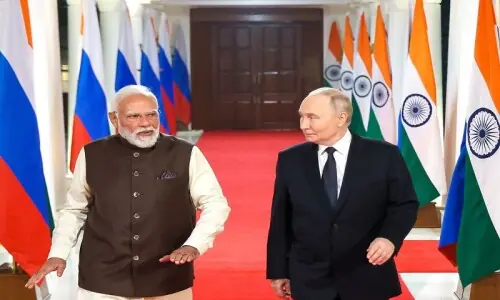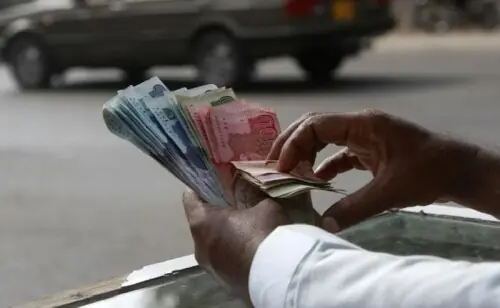IT may not look like it today but real power in the 21st century belongs not to those who win wars, but to those wielding influence through networks and connectivity.
The world is no longer neatly divided into north and south, east and west, rich and poor but between nations which want peace and prosperity for their people and those engaged in heart-wrenching wars and conflicts.
War may dominate the headlines, devastating nations and killing thousands of innocent people, but the future belongs to nations which decide to work with each other, not against each other.
For countries that are forging ahead in a rapidly-changing and globalised world, connectivity is the new buzzword. Countries, businesses, people work through networks, seek out like-minded counterparts, develop joint programmes and projects and implement them together.
States group together in regional organisations like the European Union or the Association of South-East Asian Nations (Asean). They work in smaller formations such as the Group of Seven (G7) or the wider Group of Twenty (G20). Increasingly, they also come together across continents to pursue shared ambitions and a common agenda.
The so-called BRICS group, comprising Brazil, Russia, India, China, and South Africa, is a case in point. IBSA which groups India, Brazil and South Africa is another. And now there’s also MIKTA whose members include Mexico, Indonesia, Korea, Turkey and Australia.
Frustrated by their lack of real clout in the World Bank and the International Monetary Fund and after years of negotiation — and some tough last-minute horse-trading — the five BRICS leaders agreed at a recent meeting in Fortaleza, Brazil to establish a New Development Bank (NDB) to respond to their financial and economic needs.
The new Bank will have a president (an Indian for the first six years), a Board of Governors Chair (a Russian), a Board of Directors Chair (a Brazilian), and headquarters (in Shanghai).
BRICS creates development bank, ‘mini-IMF’
The NDB has been given $50 billion in initial capital, with each of the five countries contributing $10 billion. The capital base is to be used to finance infrastructure and “sustainable development” projects in the BRICS countries initially, but other low- and middle-income countries will be able buy in and apply for funding.
A $100 billion Contingency Reserve Arrangement (CRA), meant to provide additional liquidity protection to member countries during balance of payments problems, has also been set up. While the response to the BRICS decision has mostly been sceptical in the West, the NDB initiative marks an important coming-of-age for the five rapidly-growing economies.
South-South economic cooperation is expanding dramatically, Brazil now has more embassies in Africa than Britain, China has become Africa’s most important trading partner and India is emerging as an important donor for other developing nations.
MIKTA, meanwhile, is the new kid on the block. Set up in 2013, the group presents itself as an alliance of like-minded nations which are a “force for good” on the world stage, with constructive approaches to resolving global governance deficits.
An article co-authored by MIKTA foreign ministers, Marty Natalegawa (Indonesia), Yun Byung-se (South Korea), Ahmed Davutoglu (Turkey), and Julie Bishop (Australia) underlines their determination to contribute to the “effective functioning of the multilateral order and to addressing shortcomings of global governance”.
“What brings MIKTA countries together is the functional need to cooperate, coordinate and work constructively with each other and other states in the face of global and regional challenges concerning us all,” the five ministers said.
China knows a thing or two about connectivity. Recent initiatives launched by Beijing include the construction of the Silk Road Economic Belt linking China to Central Asia and a Maritime Silk Road reaching out to its neighbours in South-East Asia.
Asean nations have developed their own ambitious “Connectivity Masterplan” aimed at building links between the institutions, infrastructure and people of their ten countries. The blueprint goes hand in hand with Asean’s plans to establish a border-free Asean Economic Community by end 2015.
Significantly, Asean remains one of the world’s most economically dynamic countries. In contrast, Middle East nations and African and South Asian countries with poor connectivity struggle to find their place in the world.
All’s not lost, however. Nepal’s Minister for Foreign Affairs Mahendra Bahadur Pandey insisted recently that the South Asian Association for Regional Cooperation (Saarc) should put connectivity high up on its agenda.
Speaking at a seminar on “Realising the Vision of a South Asian Union in Kathmandu” Pandey said South Asia was not properly connected in terms of air, roads and railways, saying physical connectivity was a pre-requisite for greater volume of trade, investment and mobility of people.
Participation in global value chains which stretch across continents and allow countries to work on one particular segment in the manufacturing process rather than on establishing full-fledged industrial plants are another example of growing inter-connectedness between nations and enterprises.
Once again, Asean states and China are an essential element of these global value chains while African and South Asian countries remain mostly outside.
To make it in the 21st century, countries have to connect, link up and cooperate. Those who recognise the importance of connectivity, live in peace and prosper. Others remain on the margins of an increasingly inter-connected world.
The writer is Dawn’s correspondent in Brussels.
Published in Dawn, July 19th, 2014


































